Building community as the end of the world is nigh
Reflecting on three decades of Greens politics, former Victorian senator Janet Rice urgently calls for slow long-term movement building. Janet rejects the post-election media narratives of Greens “failure” and the false choice between environmental aims and economic justice. What’s needed is a politics of belonging.
In March 1996, twenty nine years ago, I stood as the first Greens candidate in the western suburbs of Melbourne. I stood for the seat of Gellibrand which overlaps about 70% of what is now the seat of Fraser, including Footscray, Yarraville, Spotswood, Sunshine and Ardeer.We got just on 4% of the vote. Peter Singer, our candidate in the senate, achieved 2.9% of the vote statewide, while in Tasmania this was the election that Bob Brown was elected to the Senate. We had formed as a party in Victoria just over three years previously, and had around 100 people in total volunteering on the Gellibrand campaign. I remember well ringing through all my personal contact lists, including old school friends and parents of my kids’ childcare mates, to rustle up people to hand out How to Vote cards.
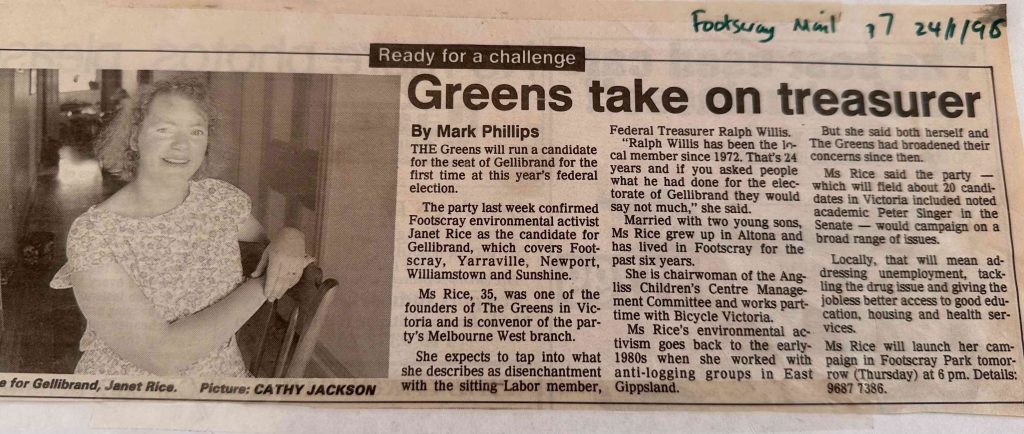
“Greens take on treasurer” by Mark Phillips, Footscray Mail, 24 January 1996
From 4% to 40%
I thought about the 1996 campaign frequently during this campaign, and none more so than at the end of election day when I was scrutineering the Footscray High booth where I had been all day. Despite having been up since 5.30 am, I had so much energy and a huge smile on my face watching the votes for Huong Truong pile up, towering beyond Labor and dwarfing the Liberal vote. We achieved a massive 40% of the vote and the Socialists had another 16%, with Labor on 33%. Since I finished in the Senate a year ago I’ve spent a lot of time and energy supporting Huong’s campaign because I think she embodies exactly what we need in a Greens representative – empathetic and caring, intelligent, committed to community and participatory democracy and a real authentic person.
I arrived at the party on Saturday night and caught up on how we had gone across the electorate. It was clear we had done bloody well… but Huong wasn’t going to win. Overall we achieved a vote of 26%, a swing close to 7% – the biggest swing to the Greens in the country.
Huong’s response when I shared both my admiration and pride at our results and my disappointment that she wasn’t going to become my local member of Parliament was succinct and wise. We are building a movement, she said.
Of course the news since election night has not been easy to take. Losing Griffith and Brisbane, and then the shock of Adam losing. I do want to take this opportunity to thank Adam for his incredible work. He was tireless, an excellent leader of the party, and a wonderful colleague.
But the loss of these three seats shouldn’t obscure that we have comfortably re-elected a Senator in each state. Congratulations to everyone of them – and to Libby in Ryan! That’s a massive achievement.
Janet and Paul outside the Sun Theatre, Yarraville, 1996
Beyond easy wins
Reflecting on 2025 in the context of 1996 I flip back and forth between both how far we have come and how far we still have to go, accompanied by the constant existential drum beat that we haven’t got time! The end of the world as we know it is nigh. Do we keep on campaigning much the same way as has evolved over the last two decades or do we need a serious rethink?
The value proposition of getting Greens elected is as strong as ever. There are lots of hugely significant decisions that get made in our parliaments and councils. We need people elected making those decisions who will act for equality and justice and peace, who will act in the interests of the community and the interests of the web of life we share this planet with, and who are committed to transforming our democracy and our systems to be actually democratic and participatory. Who are there with their hands on the levers of power sharing that power with the community. Power with, not power over.
We have been able to achieve a lot in the Senate and will continue to do so. But getting elected to the House of Representatives where governments are decided is taking longer than we thought it might. I think it’s fair to say that our strategy over the decades has been to choose the seats where our pathway to winning has been seen to be easiest, and to focus a large proportion of our resources in those seats to build support, on the presumption that once we get a critical mass of people elected – particularly if we can hold the balance of power then we will both achieve good things and that demonstration of power will bring many more voters in many more seats to us.
So what have been the characteristics of our target seats? Interestingly they aren’t always the seats where the most people who would benefit from our policies that would reduce inequality live. Sometimes they are the three cornered contests where the Liberal vote is relatively high, like Ryan where the Liberals won the primary vote. A significant portion of our support in these seats comes from people who are relatively well off and tertiary educated – who understand the benefits of our policies, but aren’t people on struggle street who would really benefit the most from getting dental and mental health into medicare and raising income support to above the poverty line.
But as Max and Stephen have just experienced in Griffith and Brisbane, these seats can be tricky to hold. Despite all the fabulous work of these two wonderful representatives, Peter Dutton’s lack of appeal led people who previously voted Liberal to vote Labor, pushing the Labor vote above ours – and most of the remaining Liberal voters preferencing Labor as well. (Sidenote — what joy to see Peter Dutton losing his seat and the pain that the Liberals are currently in!)
The other inevitability as we gain real power and look to gain more is that those benefiting from the current system realise we are a real threat to their power and wealth. So they will throw everything at us. Which of course they did, especially in the seats that we are targeting. And they are continuing to do so. I have read just so much bunkum in the last week about how we had a disastrous election campaign, were just too extreme, didn’t suck up to the planet destroyers and genocide apologists enough, and are on the ropes never to recover, so people should go back to voting for the same old same old again. I have always said to people to not expect to get a fair go from the media. That’s just a fact of Greens political life. Now we have to add other facts like distorted anti-Green narratives will also get amplified on social media; that we will have massive nasty campaigns run against us wherever we look like we have a chance of winning, and that Labor and Liberal will continue to gang up against us.
Of course we need to reflect critically on the campaign and losing Adam, Max and Stephen is a huge setback but we need to take much of the criticism of our performance for what it is – a continuation of Green bashing because we threaten the status quo.
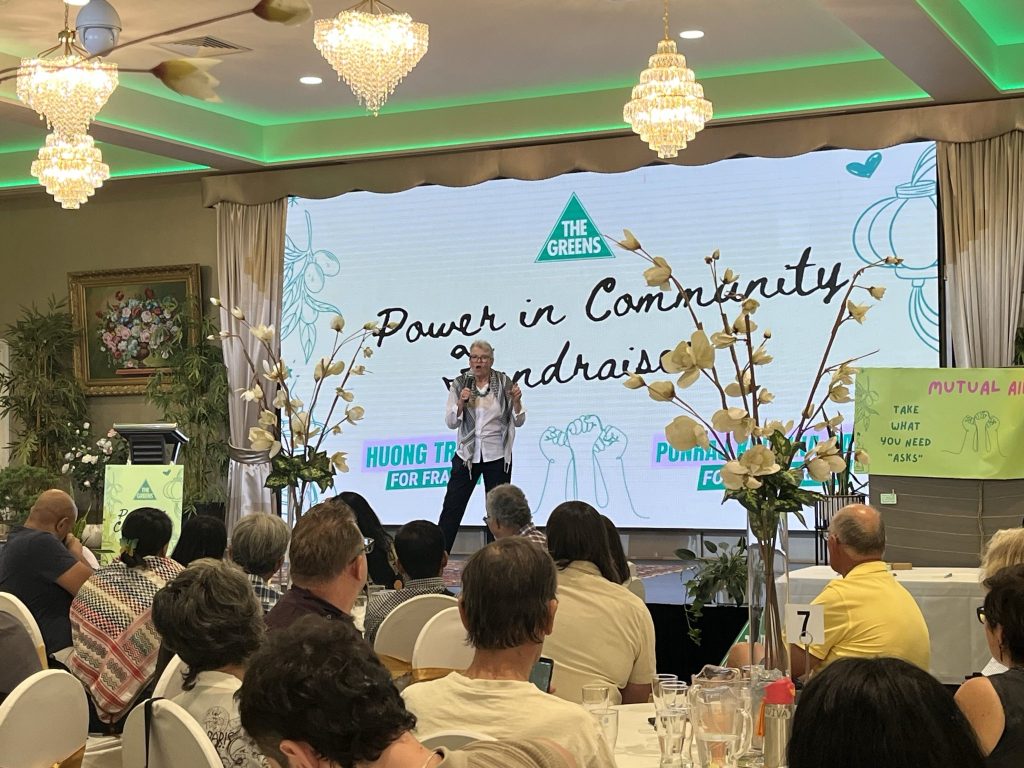
Janet Rice speaking at Huong Truong for Fraser, Power in Community, 23 February 2025
Our way forward is movement building
Fundamentally Huong’s words ring in my ears. Our way forward is movement building, across all the different sectors and demographics who are our potential supporters, namely those who would gain significant tangible benefits from our policies; those people committed to justice and equality who are allies of the people who would benefit the most; people who are committed to peace and non- violence; people who understand or are open to understanding the dire climate and ecological crises we are in; and the allies of those who don’t get a vote – people outside Australia, the web of life we share the planet with; and the people and planet of the future.
(It’s also worth thinking about who isn’t in our movements, who are highly unlikely to ever support us. People of privilege who actively want to maintain their privilege and power. People who actively support discrimination. People who consciously discount the future as not important (not including the people who are struggling to survive who haven’t got the headspace to worry about the future.)
Of course we have been building this movement, this movement of movements, since we started three decades ago. But I think the take home from this election is that that’s what we have to focus on, that’s where the solid ground is. There are no shortcuts.
Despite the urgency of the times, we have to live with the conflicting reality that building community is slow work. “The times are urgent, so let us slow down”.
The upside is that connection, belonging, and community is core to what we need in these times of turmoil, the time of monsters as the old world is dying and the new world is struggling to be born.
It would be wonderful to have a fairer voting system so our current level of support was reflected in the House of Representatives but I can’t see that coming in the short to medium term. Which means we have to continue to build our movement until we have the forty thousand or so voters in House of Representative seats to win those seats.
These votes are going to come from people who believe in us, have a sense of connection to us, where we have built a politics of belonging. This is a politics beyond electoralism. It’s a politics where people trust us to work with them, to represent them, to share power with them. Where we get to meaningfully engage with people who are disillusioned by politics, like one voter I was chatting to on election day who said about the election, and politics in general, “I don’t follow it”, as if it had no more consequences than a footy game.
I’m not saying we haven’t been doing that in the seats we have been targeting, but I am certain that there is potential to build these movements and this connection further in these seats, and particularly well beyond the seats we have targeted up until now. The biggest swings we achieved at this election were in outer metropolitan seats where people can’t afford the rent or find a bulk billing doctor, they are sick of being treated as second class citizens, they don’t want to suffer from 45 degree plus summer days without shade in their streets, and they know about and they are deeply upset about the genocide that is going on in Gaza.
Janet Rice and Huong Truong, Fraser campaign, 2025
A thousand flowers to bloom
I understand our strategy of narrow targeting of a few seats and resourcing them well. But I think the most searching question we have to ask ourselves post election is did we get the value we hoped for from this strategy? What should our criteria be in the future as to where resources get spent? Can we spend a small amount of financial resources to unleash a groundswell of volunteer commitment in particular areas?
I think we need to recognise the fertile ground that we have beyond our targeted seats and facilitate a thousand flowers to bloom. Our work in these suburbs and regions will be based on relationships, of listening, of empathy and care. And being clear about what the Greens stand for and how us working together will benefit them. It may be that our work in these seats won’t result in electoral wins at the next election, and that we will be criticised for spreading rather than concentrating our vote. But it will yield longer term benefits to both the party and the communities we are working with.
It may also be that by broadening where we work we are less vulnerable to the targeted campaigns that will be run against us. It certainly was a relief in Fraser to be flying under the radar, without smear campaigns being run against us.
I’ve been musing on what our offer is to the broad range of people we are seeking to embrace in our movement. The tension that is perceived to exist between a focus on our work to achieve structural change that is likely to take some time and only be achieved when we have political power; and how much we focus on responding to people’s immediate material needs because of the inequality that is core to neoliberalism. So much of the commentary about us over the last week and indeed internal discussions about how much of a focus we have on the environment and climate compared with equality and justice can be boiled down to an assertion that we should only focus on one part of our agenda at the expense of the rest.
So it’s worth being clear about what we are working for and what our movement is. We are offering more than a transactional reward of something of immediate personal value in return for their vote (though our agenda will materially benefit a lot of people who need those benefits and that will be what attracts them to vote for us).
We are seeking to transform our society away from destructive neo-liberal capitalism into a society that is just, sustainable, caring, democratic and non violent. We know that this isn’t a small job but it’s worth working for and we will keep working for it. An essential part of this is going to be transforming our parliaments and other state institutions, which we aim to do through democratic change. Yes, currently politicians in general and parliament sucks. It has to change.
Our party, our MPs and Councillors, our branches and working groups work simultaneously at different levels to achieve change:
- We advocate and build support for the long term structural change we need
- We work in the current political system for incremental changes we can achieve now
- We work with community to do what we can to alleviate the impacts of the current unjust and unsustainable systems
- We advocate for and try to achieve justice for individuals who are being badly treated by the system
We work non-violently and collaboratively within our party and with other people and groups, and our elected representatives commit to working collaboratively, respectfully and democratically with the communities they represent. We care about people. We aim for consensus, to work peacefully and well together, despite our differences. This feature of our work is so often overlooked in what sets the Greens apart from other political players. To me, our commitment to collaboration and consensus is our most important feature and underpins everything else we do.
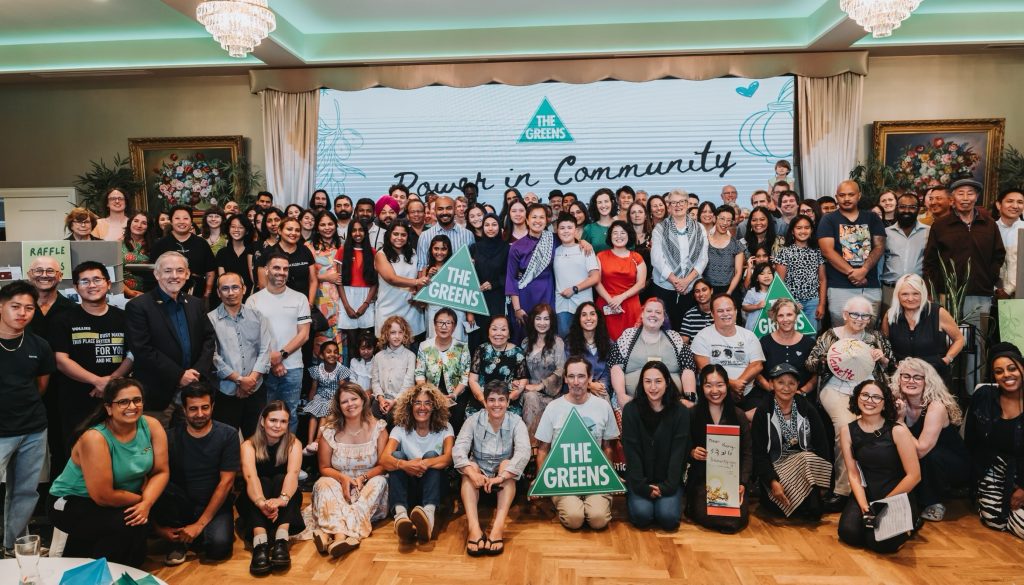
Huong Truong for Fraser, Power in Community, 23 February 2025
“If I can’t dance, it’s not my revolution”
So what does the job ahead look like? I don’t know what the mood on the ground is like in the rest of the country but in Fraser our volunteers are eager and keen to keep building. That in itself is a testament to the campaign that Huong and the team ran, where our aims when we set out included growing a huge, connected grassroots movement of local activists and making the most of people who turned up, with lots of joy and no burnout.
So I am confident that the tasks ahead are doable. We need to:
- Reach more people and build relationships with them. We need to communicate why we are doing what we are doing, and enter into conversation with people, listening and taking feedback, with a genuine commitment to sharing power
- Continue our connection with movements and groups who are aligned with us where they currently exist
- Support movements and groups to grow where they don’t exist or are struggling
- Create and invite people into political spaces where they feel connected and that they belong and can be part of a bigger movement for change and where they will have fun. “If I can’t dance it’s not my revolution”.
- Create entry points for people – particularly through our work at a community level, and through acts of kindness and caring
- Communicate and work with people who are struggling and oppressed so they feel and understand that when we are working for universal values – for other people, other species, for future wellbeing that it isn’t at their expense.
There are good reasons as to why a lot of potential Greens supporters, potential members and indeed members of our movements don’t currently vote for us that we need to address. It’s worth us being clear about this too.
Many potential supporters don’t understand what we stand for, or have a view of what we stand for that has been conveyed to them by our political opponents and through the mainstream media. Some people support our aims but don’t support or don’t understand our strategies for change. Others think that a small amount of incremental change will be sufficient. Others support some of our aims but not all, for example people whose religious and/or cultural beliefs on gender and sexuality are discriminatory.
Others understand and support all of our aims and policies, but they don’t trust us to deliver. They may have been previous supporters and feel burnt by us in some way.
Or they don’t see us as winners and they want to be on the side of the winners. Or don’t understand preferential voting. Or are cynical that things can change – they have given up on hope which is a sad and disempowering place to be. Or are tuned out of the political process because they can’t see any value in engaging – they have better things to do
It’s going to be by building relationships with people, beyond handing them a How to Vote card at election time or having a short conversation with them at their door that we can overcome these barriers and build trust, so that people feel they belong and that they have a say, and despite possible reservations they may have about us will reward us with their vote.
We are now at the stage of our growth as a party that we have a critical mass of people to do this work of relationship and movement building. I look forward to continuing being part of it, being inspired and uplifted, experiencing meaning and joy at being part of the Greens as a beacon in my life in the difficult times ahead.
Janet Rice, a community activist and facilitator, recently retired from the federal parliament. Janet Rice has been a passionate campaigner for justice, people, and the planet for more than 30 years. She took her seat as a Greens Senator for Victoria in 2014. A climate scientist by training, Janet began her working life campaigning to protect forests. She was part of the 1983 Franklin River Blockade and a leader of the campaign that resulted in the creation of the Errinundra National Park in East Gippsland. Within a decade, she was a founding member of the Greens in Victoria. Janet was the party spokesperson for LGBTIQ+ issues, family, ageing and community affairs, forests, foreign affairs, and multiculturalism, serving as the Federal Greens’ Party Room Chair and, in Parliament, Janet as the Chair of the Community Affairs References Committee.
Feature images. Courtesy of Janet Rice.
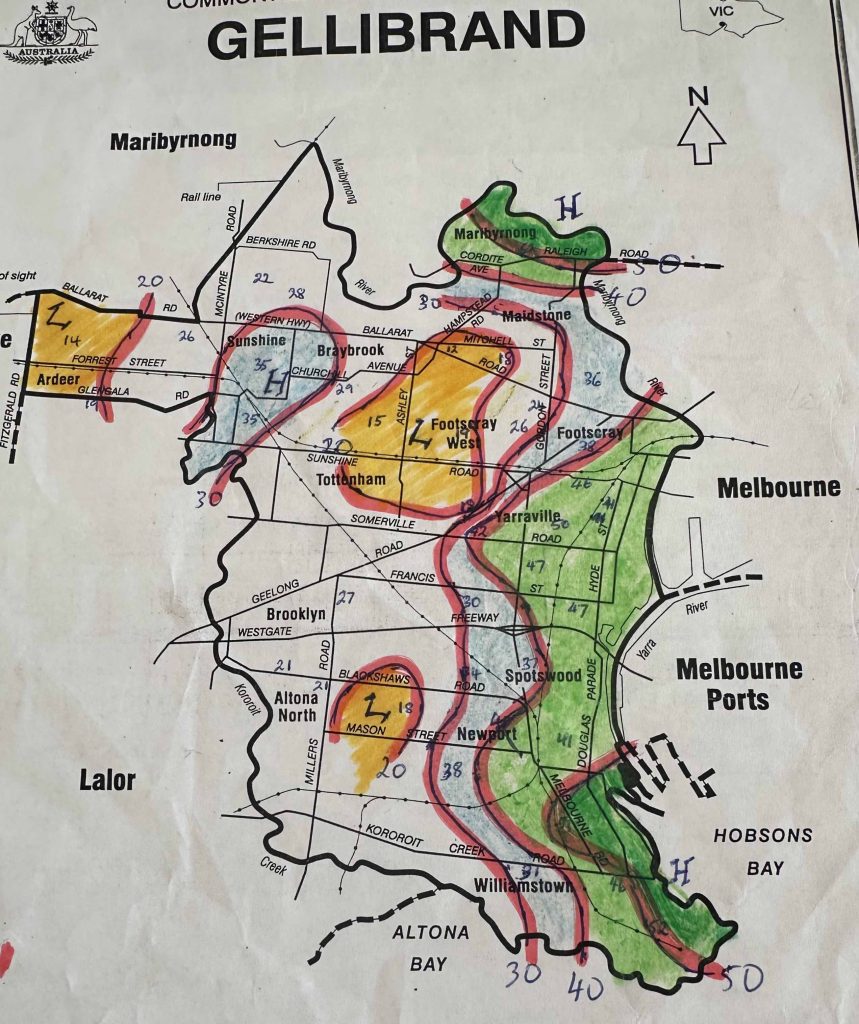
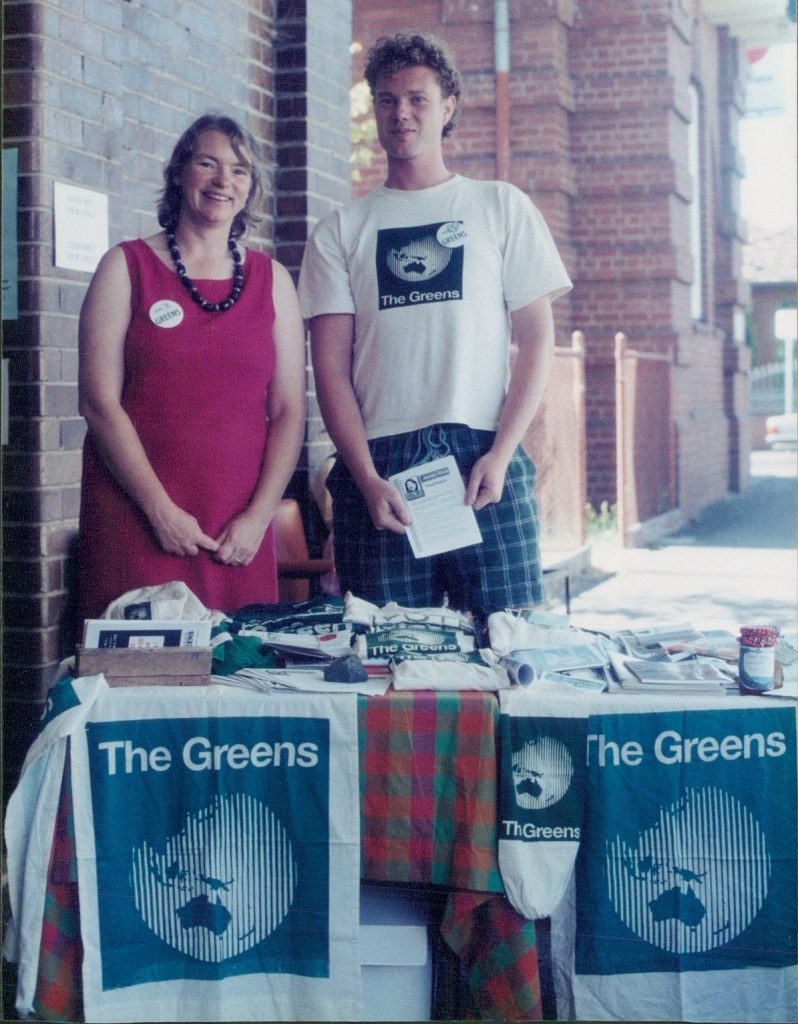
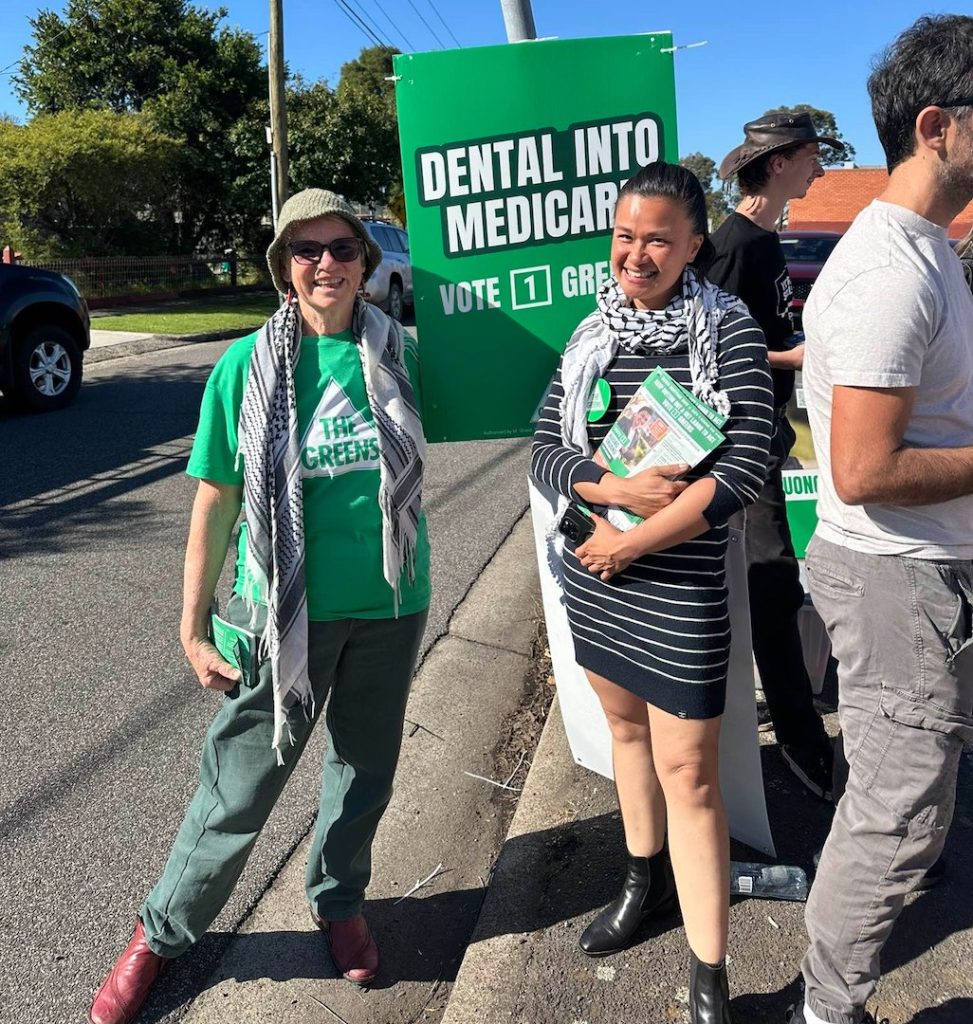
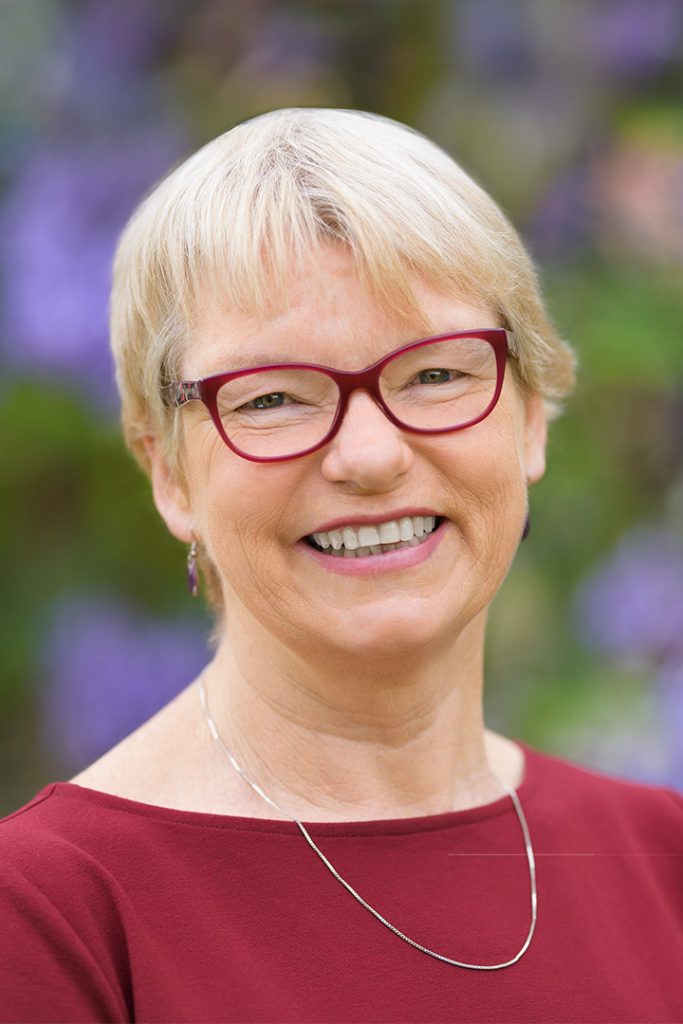
Thank you so much Janet. I am pleased to say that branch building and empowering is a large part of the new Strategic plan developed by the Victorian Strategy Steering Committee. There are a number of strategies we can hopefully employ to succeed. The Strategic plan still needs to be finalised and endorsed by State Council and then our membership.
Thanks, Janet, for providing historical perspective and. hope .
You are very correct about where the biggest swings were. I think the biggest swing to us at any booth was 26% in Fawkner in the north end of Wills. This was no miracle, it came from the type of work you described
Love this piece Janet! Thanks for your insights! Definitely resonates a lot with what I’ve been saying… https://jonathansri.com/establishmentvibes
I’d love to hear more from you in future about practising democracy and how we resist over-concentration of power within MPs’ offices, which I think is a key factor that goes on to shape the over-concentration of campaign resources in specific seats.
Thank you Janet – such a great analysis of where we Greens are at and ‘where we need to go’.
Here in Warringah we face the challenge of being ‘swamped’ by our ‘teal’ MP Zali & the efforts of her supporters (some of whom used to be Greens supporters but never Greens members) to avoid a ‘take-back’ by the Libs (some of whom regard this area as their entitlement. However, our fairly small group of members & supporters are fairly happy with the Warringah result – Zali re-elected, Greens young HoR candidate (and newly elected Sept 2024 Local Councillor) Bonnie Harvey held or very slightly increased Greens vote & our 16% Senate vote was great.
Strongly agree, Janet. A fellow volunteer in the ACT when we were out doorknocking one day had such a good take on the false “the Greens should stick to climate/environment, and not get distracted with social justice” complaint. She said : “People can’t be expected to care about climate/environment when they’re fighting to keep a roof over their head.”
The expert opinion suggests that all community activists need to understand how big and small media really work. When we understand this, that The Medium Is The Message, this will enable our Green lessons to be better understood by the general adult audience.
So much of this Western World is affected by Hollywood, Bollywood, etc. We Greens can have our folk music, stories, arts, and communities.
Luckily we have better standards of educational knowledge and better standards of mental and social health than the less advantaged adults.
When we learn to use Simple English, with simple and emotional messages, the lesser aware adults might slowly trust these new visions and replacements of the old ideas.
Experienced social change agents are hoping that formal education might affect adult voters. The mainstream and some others might be good at doing this.
Can the Green activists also learn to be adventurous and environmental on their educational methods(lobbying) as well? Simple diffusion of novelty of not enough. Amazing excitement of much better. How, when demand much more innovation and experimentation. Headline attraction might be needed. Simple and clear. Don’t discourage songs and slogans. These are essential tools for all activists, both good and bad.